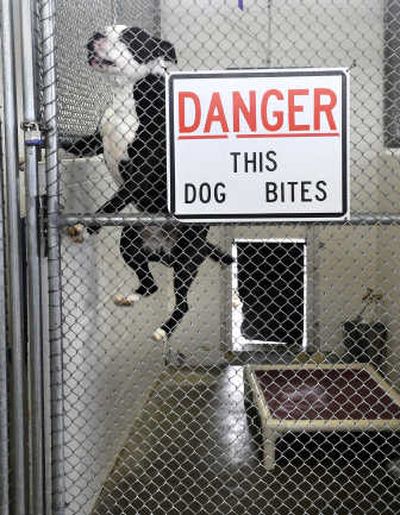Rescued dogs’ future uncertain

Cindy Taskila, kennel manager, dog whisperer and treat lady, is greeted by the eight excited pit bulls kept in kennels for the past year at the Spokane County Regional Animal Protection Service.
Chewie, a dogfight veteran, leaps four feet in the air as he greets her. Rita, her shy favorite, rolls her eyes and climbs into Taskila’s lap. Battle-scarred Callie politely takes a dog biscuit.
Despite this happy scene, it’s SOS time for these dogs, dubbed the “Great Eight” by animal welfare advocates trying to find homes for the pit bulls, seized last year in the Spokane Valley as evidence in a high-profile case that led to the first dogfighting convictions in Spokane County and Washington state.
“We don’t want these animals put to sleep. We’ve bonded with them,” said SCRAPS animal control officer Nicole Montano as she watched Taskila talk to the dogs and pet them.
Spokane County Superior Court Judge Tari Eitzen ordered the dogs kept alive during the trial of Peter Nelson and Alfredo Renteria, convicted in February of animal fighting, a Class C felony, and keeping an illegal kennel in the Spokane Valley. Each was sentenced to eight months in jail.
With the trial over, the court recently ordered the dogs relinquished to SCRAPS, which is trying to place them somewhere outside the Inland Northwest for fear they might once again end up in local dogfighting circles.
“We are looking for proper long-term placement for these dogs to live out their natural lives,” said Patricia Simonet, SCRAPS’ assistant director and an animal behaviorist.
Callie, Chewie, Fatty, Rita, Zeta and Gorda are the adults. Montano named the youngest dogs, now 20 months old, Justice and Hope. They were too young to train for dogfights when they were seized in April 2007.
Some of the older dogs have scars and aggression problems from being forced to fight, but most could be rehabilitated with proper care, according to a SCRAPS report produced for the court.
A leading animal welfare activist agrees.
“My belief is they are the innocent victims of criminals. Even Chewie, who lacks social skills, is a victim. It’s amazing they’ve done as well as they have,” said Sherry Woodard, a trainer and animal behavior consultant for Best Friends, a Utah animal sanctuary. Woodard reviewed a SCRAPS video of the dogs and is joining in the effort to find them homes.
But where can pit bulls trained in the dogfighting underworld be placed?
Although friendly, they aren’t housebroken and have never lived in a house, said Simonet, who evaluated the dogs with Taskila. “These are not typical dogs,” Simonet added.
The adults are “dog aggressive” as a result of their past, according to the SCRAPS report. The worst case: Chewie, the only male, after a year still exhibits “fear aggression” toward dogs and many people. Justice and Hope are friendly to people and animals alike.
Animal welfare activists throughout the West are trying to help SCRAPS, saying the Great Eight deserve to live out their lives at sanctuaries or in carefully selected homes. But there is little space available.
Spindletop Refuge in Willis, Texas, initially agreed to take all eight dogs but backed out when they had several dogs returned, said Simonet.
According to Bad Rap, a California group with expertise in pit bull rehabilitation and placement, behavior testing conducted by SCRAPS shows most of the Spokane dogs scored promisingly well on human interaction – but not as well as the average dog during “dog to dog greeting.”
Best Friends, a Kanab, Utah, animal sanctuary on 33,000 acres, is disseminating news about the Spokane dogs’ need for new homes on its Web site. The group hailed the conviction of Nelson and Renteria, calling SCRAPS and the dogs “heroes in the animal welfare movement.”
Woodard, of Best Friends, has worked with pit bulls rescued from Hurricane Katrina and with the so-called “Vicktory Dogs,” 23 pit bulls seized from Michael Vick, a former Atlanta Falcons football player serving a prison sentence for operating a dogfighting ring.
The Utah shelter has no room because, in addition to the Vick dogs, it has about 60 discarded pit bulls and pit bull mixes, Woodard said.
“We have nearly 100 dogs who don’t want to live with other dogs. That takes up a lot of room,” Woodard said. “Sadly, almost everyone is full. That’s the current challenge.”
Pit bulls and pit bull mixes are dying at high rates at shelters nationwide because of unscrupulous breeders catering to a subculture that wants aggressive dogs, Woodard added. “They are being created at a rate we can’t keep up with,” she said.
Woodard said the best place for the Spokane dogs would be in private foster homes with experienced handlers who could train the dogs before they go to permanent homes.
“They should not be living in a dog run. Most of them want to be on someone’s lap. They are very, very social with people,” she said.
Taskila, who has spent many hours with the dogs at SCRAPS over the past year, agrees.
“They’ve been very accepting to human companionship,” she said. SCRAPS caretakers bought them chew toys and beds and even have them listen to audiotapes of happy dogs playing to make them more comfortable.
SCRAPS has spent at least $25,000 on the dogs’ care, Montano said. Although the court ordered Nelson and Renteria to pay $16,000 in restitution for boarding costs, SCRAPS officials are skeptical about ever getting that much.
But they’re hoping for a happy ending.
“I just don’t think they could go to an average home at this point. But I’d love to see them in a far more enriching environment than we have here for them,” Taskila said.